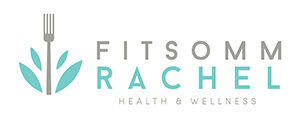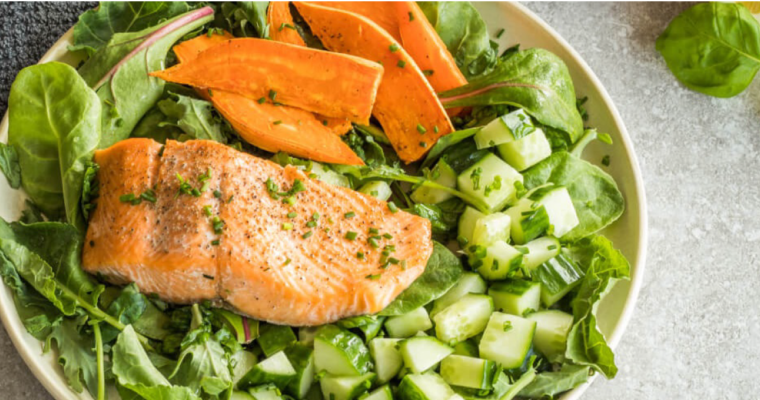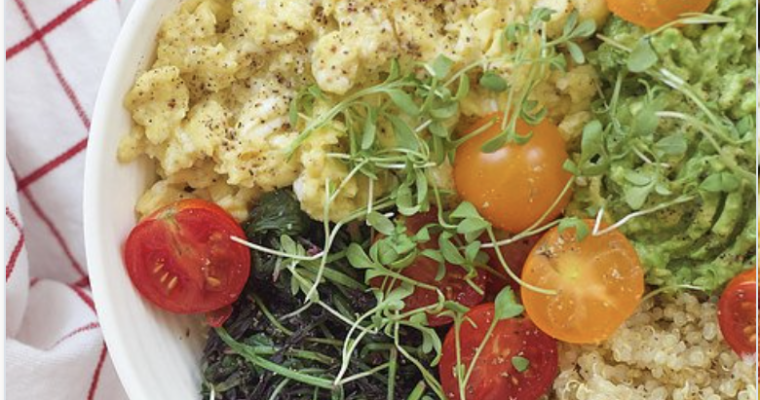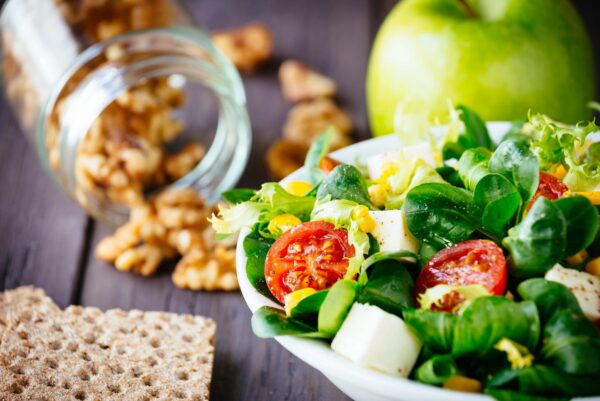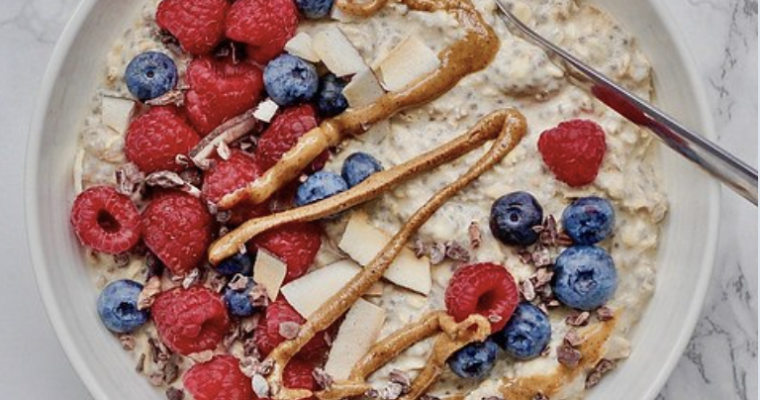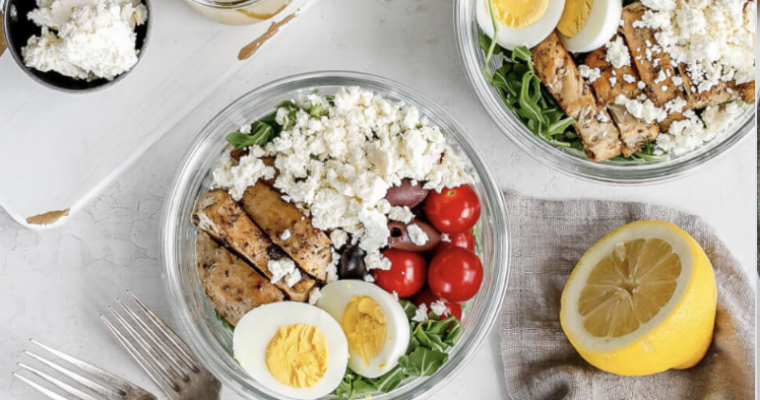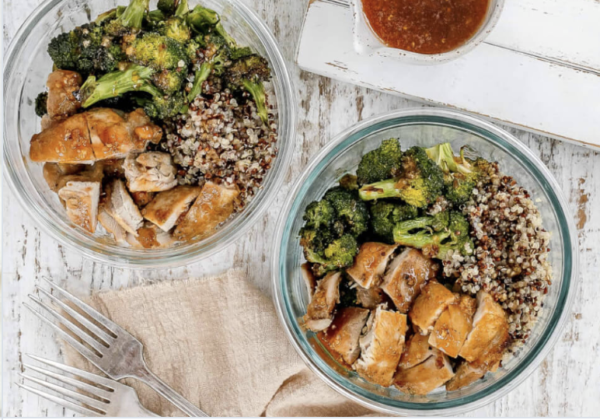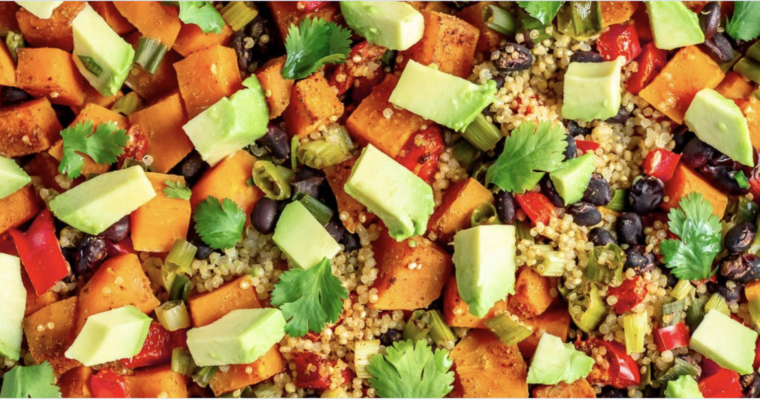When you ‘train’ your body and mind to crave simple and nutritious meals, you will always feel satisfied. And when you learn to prepare your food in a way that supports your goals, life just becomes so much easier. The more elaborate and complicated you make your everyday meals, the harder it is to create sustainable satisfaction. When I’m preparing my typical meals, I focus on the following which makes any meal prep so much easier.
1. Protein First!
Quantity: Shoot for >30 grams per meal. The range I tell clients is 30-50 grams/meal, on that higher end for men. Ideally to build muscle mass, maintain current lean muscle mass and live longer you should be consuming your IDEAL body weight in grams of protein daily. WHY?
Protein is the building block for your muscles and muscles burn fat. Eating protein at every meal keeps your metabolism revved up all day long.
– Protein has a high thermic effect, which means it actually increases your metabolism.
– Protein is the most fulfilling macronutrient – it actually signals your brain that you’re full.
– Protein supports muscle tissue during weight loss so your body loses fat instead of muscle. More muscle = higher metabolic rate.
Focus on leaner cuts of meat and dairy to make hitting your protein goal easier and think about adding your own healthy fats so you can control the amount you’re consuming AND the quality.
Examples:
Choose nutrient-dense, leaner protein sources, animal-based if possible:
Sirloin, filet, chicken breast, ground turkey, pork tenderloin, white fish, tuna, salmon, lean ground beef, eggs, non-fat or low-fat Greek yogurt, and cottage cheese. You can use protein powder to fill the gaps but don’t rely on it for every meal. My favorite protein powder is ANY flavor from Just Ingredients. Use code fitsommrachel for 10% off your order.
2. High-Quality Fats
Let’s shout It out together now – fat does not make you fat! Fats play an integral role in so many processes within our body – from hormonal control and production to brain power to reducing inflammation to blood sugar control and… fat loss. Fat also slows down the absorption of sugar into the bloodstream, reducing blood sugar spikes and keeping your body in fat-burning mode.
Quantity: Typically between 5-30 grams per meal depending on your personal preference and goals as well as meal timing around your workouts. I like to think of healthy fats as “condiments”.
Examples: Avocado, olive oil, coconut oil, butter, ghee, nuts and seeds, nut butter, some cheese, fattier fish, etc.
3. Fiber
Fiber is a type of carbohydrate that is not digested and does NOT raise blood sugar. As a matter of fact, it actually slows down the absorption of sugar into the bloodstream. Fiber keeps everything moving and is essential for a healthy gut and digestive system.
Types of Fiber:
Colorful Non-Starchy Veggies
Quantity: Eat as much as desired! Veggies add volume and fiber to keep you fuller, longer and of course help you bring in lots of micronutrients. But be cautious of adding too much fiber in one sitting because it can cause GI distress, bloating, gas, etc. if you overdo it.
Examples: Asparagus, broccoli, leafy greens, summer squash, cauliflower, bok choy, cucumber, tomato, etc. (too many options to list out but you get the idea)
Fruit & Starchier Carbs
Quantity: Typically between 20-50 grams (which is about ¼ cup to 1 cup depending on what you are eating), depending on your personal goals and preferences as well as activity level. I like to ensure about 50% of my starchier/fruit carbs are allotted to meals surrounding my workout (i.e., in the meals before and/or after workouts)
Strength training <3 times per week: 1 serving/day
Strength training 3+ times per week: 2 servings/day
Examples:
All fruit (my favorite lower in sugar are berries), potatoes- sweet potatoes/purple, winter squash, oats, wild rice, quinoa, beans, corn tortillas, and lentils
4. Don’t forget the Salt & Spices!
Use high-quality salt for flavor and to ensure electrolytes are balanced (sodium also helps influence the absorption of nutrients). Keep a large selection of spices in your pantry to ensure that you never get bored with flavors (Trader Joe’s has great selections of spices).
Quantity: ⅛ – ¼ teaspoon salt while cooking or added to meals. Spices/seasonings as desired
5. Overall Timing – what do I eat and when?
The meals around your workout are ideally high protein, higher carb, and lower fat.
The meals further from your workout are still high protein, but higher fat and lower carb. I also like to eat more of my carbs earlier in the day for energy + I workout in the morning.
Want to take a deeper dive into EXACTLY how much you should be eating in a day based on your lifestyle and activity level? Fill out my FREE 15 minute consultation form and we can discuss your individual needs!
